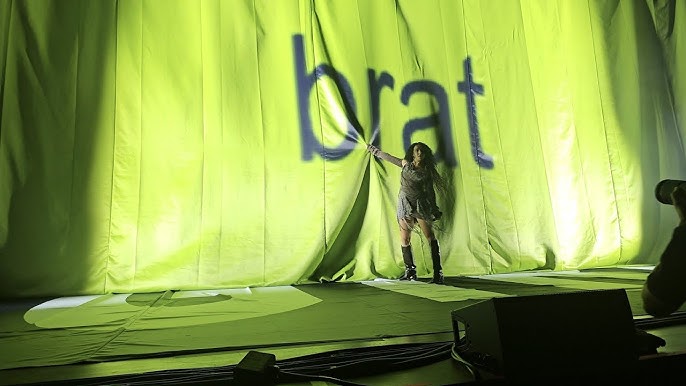On 10,000 gecs, 100 gecs Keeps Us Guessing

Breaking through in the late 2010s, 100 gecs became the face of the nascent genre known as hyperpop. The fresh, irreverent sensibility of vocalist-producers Dylan Brady and Laura Les spawned legions of admirers, detractors, and imitators, mashing up pop, rock, trap, dubstep, ska, and more, all in an ultra-hooky, heavily-processed, bass-boosted package. After the 2019 release of the duo’s debut LP, 1000 gecs, they began work on a follow-up album, but it was delayed over a year from its initial planned release in early 2022. Doubt seeped in: would 100 gecs be able to keep up with a scene that had evolved so quickly? When the intense, addictive sonic blast that is 10,000 gecs finally arrived on Friday, March 24, the answer was a resounding “yes.”
On 10,000 gecs, the duo doesn’t try to out-weird their last record. Indeed, much of the songwriting on 10,000 gecs is, by 100 gecs’ standards, more traditional and pop-minded. Sonically, they take a bit of a lateral move, leaning more heavily into ska-punk and nu-metal instead of reproducing the glitchy electropop of 1000 gecs.
Of course, 10,000 gecs is anything but a straight-ahead rock record, and from the opening seconds of the first track, “Dumbest Girl Alive,” it’s clear that the duo’s maximalist, gonzo sensibilities are fully intact. The song opens with the famous THX deep note, before a record scratch and the introduction of a Papa Roach-esque guitar riff, which plays alongside the duo’s signature crashing percussion and electronic whirs. “Dumbest Girl Alive” features plenty of the sonic signifiers that have come to be associated with 100 gecs, from speaker-bursting compression to vocoded singing, while also introducing the album’s rock-leaning sound, albeit all through a thick layer of the duo’s grab bag of sound effects.
“Dumbest Girl Alive” and the catchy, bouncy “Hollywood Baby” draw from nu-metal, and later in the album, “Billy Knows Jamie” takes the sound even further, with shout-along verses and heavy beats reminiscent of Limp Bizkit that build to a chaotic hardcore breakdown at the song’s climax. Some of the album’s other rock-inspired tracks, like “Frog on the Floor,” “Doritos and Fritos,” and “Mememe” lean heavier into ska. “I Got My Tooth Removed,” an upbeat yet grim ode to Les’s dental problems, even features full-throated blasts of horns in its chorus.
Yet other songs don’t feature a trace of rock guitar. “757,” the album’s second track, would probably be the most at home on 1000 gecs, with a sound driven by chiptune synths and high-pitched, heavily-processed vocals. “One Million Dollars” is perhaps the album’s most experimental song. The only one to not feature vocals from either Les or Brady, “One Million Dollars” is instead driven by a variety of computer-generated voices. These voices repeat the title of the song across a chaotic soundscape that moves between trap, heavy metal, and distorted breakbeat. “The Most Wanted Person in the United States” sees Les and Brady speak from the sardonic perspectives of serial killers on the run over a laid-back bass groove that recalls the Red Hot Chili Peppers.
Amid the eclectic sonic landscape of 10,000 gecs, there’s one defining feature of the duo’s earlier material that you won’t hear. In previous work, Les, who is a transgender woman, used effects to pitch her vocals significantly higher, both as an artistic choice and a method of addressing her voice dysphoria. Reminiscent of sped-up “nightcore” edits, Les’s hyper-filtered voice became central to the sound of 100 gecs. In between 1000 gecs and 10,000 gecs, though, Les explored her voice further, gaining greater comfort and confidence. Thus, on 10,000 gecs, the chipmunk filter is no more. While the ultra-saturated, post-ironic music of 100 gecs can hardly be called raw, Les sounds more human, even vulnerable at times. Combined with the greater emphasis on rock guitar and acoustic drums over trap beats, it adds up to a warmer-sounding 100 gecs.
It’s that mixture of the organic and the artificial that makes 100 gecs such an interesting group. Some of their lyricism seems personal, like the angsty self-loathing of “Dumbest Girl Alive,” and the flickers of palpable pain in “I Got My Tooth Removed.” Others, like “Billy Knows Jamie” and “The Most Wanted Person in the United States” come from a place of obvious fictional storytelling. A third cohort seem to fall into absurd, so-dumb-it’s-genius stream-of-consciousness, like “Frog on the Floor,” which regales us with a tale of a comic amphibian, or “Doritos and Fritos” (sample lyric: “I’m joining the circus, I’m going berzerkus / At 7-Eleven, I’m drinking a beverage”). Is “One Million Dollars” a philosophical warning about the dangers of wealth that Les and Brady have witnessed since signing to a major label? Or just a musical piss-take? It’s so ironic, it’s sincere. It’s so sincere, it’s ironic.
It’s perhaps a testament to the strength of the duo’s production and songwriting that, despite the massive range of sounds and tones contained within the brisk 26 minutes and 53 seconds of 10,000 gecs, none of its 10 songs feel like anything but pure 100 gecs. It’s a world where ska horns, nu-metal riffs, trap beats, glitched-out synths, ultra-processed vocals, and explosive percussion can live together in perfect harmony. The album’s deliberately abrasive style may not be engineered for mass appeal, but Les and Brady’s unabashed charisma, maximalist vision, and undeniable production chops have rightfully earned them a devoted following, and one can only wonder what their next record, perhaps titled 100,000 gecs, might sound like.
Oscar Kim Bauman can be reached at obauman@wesleyan.edu.








Leave a Reply